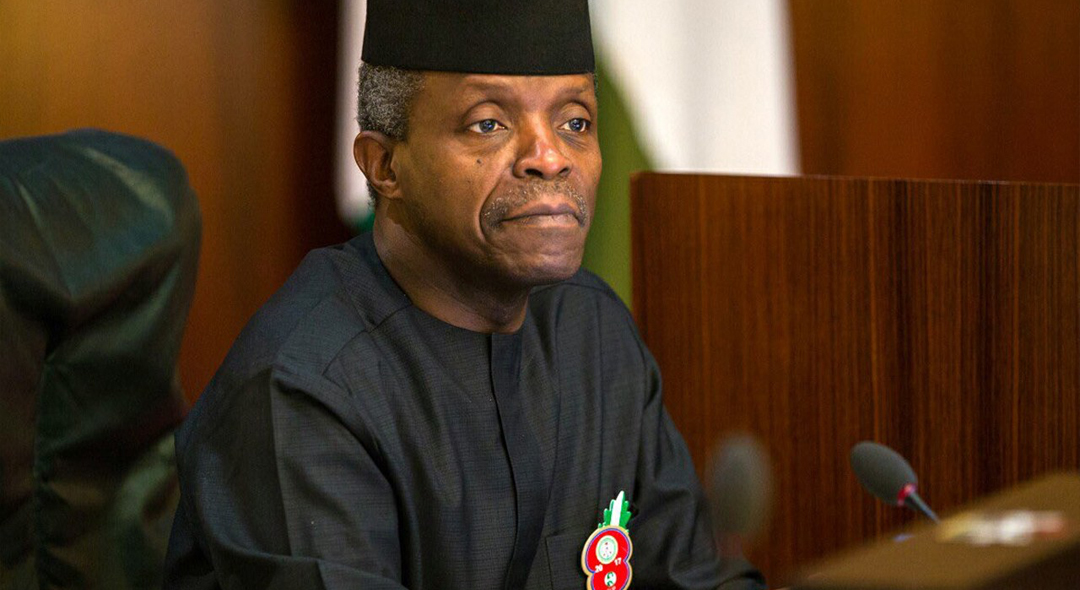The National Economic Council (NEC) which is being concurrently spearheaded by the head of Nigeria’s Economic Management team, Vice President Yemi Osinbajo has on Thursday 22nd August, 2019 disclosed that there is unprecedented economic stability and growth during the previous eight successive quarters of the years spanning through 2017 to 2019, since Nigeria emerged out of economic recession.
The NEC meeting of Thursday 22nd August, 2019 h which had in attendance state Governors such as Aminu Bello Masari (Katsina), Bello Matawalle (Zamfara), Bala Mohammed (Bauchi), Abdullahi Umar Ganduje (Kano), Aminu Waziri Tambuwal (Sokoto), Godwin Obaseki (Edo), Mohammed Badaru Abubakar (Jigawa), Simon Lalong (Plateau), Gboyega Oyetola (Osun), Samuel Ortom (Benue), Abdullahi Sule (Nasarawa) and Kayode Fayemi (Ekiti).
During the meeting, Vice President, Prof. Yemi Osinbajo affirmed that the macroeconomic environment of the country has shown significant growth and stability since after the recession period.
Also, the newly inaugurated Minister of Finance, Budget and National Planning, Mrs Zainab Shamsuna Ahmed, While affirming the Economic Recovery and Growth Plan (ERGP), as the basis for the Medium Term fiscal strategy,highlighted that Macro-economic stability has been achieved with growth in end Q3, 2019 at 3.01 per cent; continued increase in Real GDP from 1.89 per cent in Q2, 2018 to 2.01 per cent in 2019; there has been significant growth in non-oil sectors of the economy.
She added that other significant economic growth includes continuous contraction of inflation rate since 2017 from 18.72% to 11.08% in July 2019; the contribution of the non-oil sector to GDP has also increased 90.4% in Q1 2018 to 90.9% in Q1 2019.
In furtherance to the development, the Governor of Jigawa State, Alhaji Mohammed Badaru Abubakar, presented an update on the activities of the Committee set up by the NEC on export promotion. Highlights of the committee's work include:
a- Adding an extra UDS150 billion (minimum) to Nigeria’s foreign reserves cumulatively from non-oil exports over the next 10 years;
b- Creating500, 000 jobs annually; and
c- Lifting 20 million Nigerians out of poverty.
Also, the governor identifies some of their achievements to include designing an implementation plan for the implementation of ERGP, harmonizing Export Development Plan Submitted by the 36 states, identifying projects based on the implementation plan and States submissions, setting- up of templates and schematics for domestic export warehouse and anchor programme for exporters.
The committee also achieved Provision of processing equipment and conducted Capacity Building Programme on Strategic Products in the Zero Oil Plan in Kaduna, Benue, Ondo, Edo and Imo States. The products targeted are Palm oil, Soya Beans and Ginger.
In monetary value, Badaru further revealed achievements recorded through the zero Oil Plan to as non- oil exports (excluding natural gas) have risen from U$1.17 billion in 2016 to US$3.16 billion in 2018 while strategic sectors identified in the zero oil plan have seen growth where cocoa exports have risen by $79.4 million since 2017, while sesame exports increased by $153 million since 2016. This according to him indicates an increase of more than 100% in the non-oil subsector of the economy.
Additionally, the Chief Executive Officer(CEO) of the Nigerian Stock Exchange (NSE), Mr. Oscar Onyema informed the council that, Nigeria’s stock market is tagged as Africa’s foremost Exchanges servicing No-1, with a Market Capitalization of N25.7trillion ($70.7bn).
Onyema added that, over the last 5 years, N10.3tn in long term capital has been raised by both the Federal and State Governments in the form of Government Bonds.The Capital market according to him offers innovative financing solutions for Nigeria’s $100bn infrastructural challenge.
It is expected that, if this trend is sustained, the country’s economy will continue to grow in an unprecedented manner. This was made possible by the attention adverted to the non-oil subsector of the economy.



















